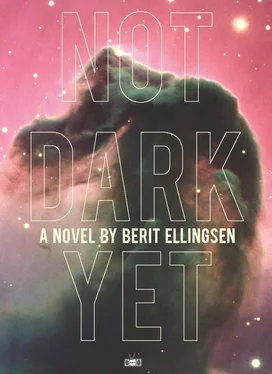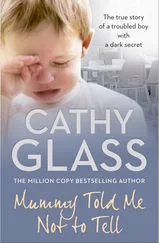In the town center the streets were empty and damp from rain. The store windows were so dark they seemed incapable of reflecting the morning light. Even the train station was unlit and closed. He squatted in a corner of the platform, trying to get away from the wind that was always high this close to the sea. On the other side of the rails aspen and rowan trees stood yellow, as if it were still autumn. He trembled with cold, and now that he was beginning to get his breath and thoughts back, he was both thirsty and hungry.
He worried that the first train would be a commuter train and that the station might get crowded, but when the train finally arrived the space was nearly empty. Only a few other people were waiting, hunched inside their clothes, looking more asleep than awake. He let them board first, they entered different cars, then he snuck in behind them. He went straight to the bathroom, closed the door quietly without turning the lock, and pulled the toilet lid down to sit on and keep his feet away from the floor. Despite a deep, pulsing thirst, he didn’t dare turn the faucet on even after the train started moving, as he feared the pipes might rattle, signaling that the bathroom was in use. Neither did he dare crank up the tiny radiator beneath the window, in case it too would make noises as hot water flowed in.
Unhurried footfalls were approaching in the hallway outside and he held his breath, but the conductor didn’t try the door, and he finally started to settle. After a while the warmth in the bathroom and the clacking of the wheels became so sleep-inducing that he had to get up and stand, away from the window. At every stop he heard steps outside and leaned against the door, but all of them passed by. After several hours, right before his station, he rushed up, ran the faucet without worrying about the sound of the water and the trembling of the pipes, and drank his fill of the metallic, lukewarm fluid.
The worn train platform on the moor was empty as usual. During the walk back to the cabin, he noticed that he had stopped shivering and that his hair was almost dry. He took out a wrinkly winter apple from the pocket of the old coat, rubbed it between his palms and bit into it. The flesh was dry and sweetly overripe, but it was the best meal he had had in a long time.

In the ruined cabin he stuffed the stolen clothes into a plastic bag, changed into the t-shirt, running pants, and boots left after the flood, and started walking toward the lake in the east.
The still surface mirrored the blue mountains and the wall of firs that skirted the water. The sky was overcast but luminous, as when the sun is about to break through the clouds on a bright summer morning. The song from blackbirds and robins echoed across the shore, and somewhere among the trees a woodpecker beat out its signal. In the lake a gray heron shrieked and lifted from the surface. The air smelled of leaves, pine, and grass. He waded into the lake, the water so still he could see through the surface and down to the bottom. He continued until the stony substrate vanished and the water turned dark. There he threw the plastic bag as far out into the lake as he could. The bulging object gave up some bubbles, tilted slightly, then sank. Rings spread slowly on the surface, intermingled and merged, before the water smoothed again, like a sleeping mind after a nightmare.
He turned and waded back to where the water met the grass. There he pulled off the t-shirt and stepped out of the boots and sweatpants. He knelt in the shallow, fresh water and rinsed his hair and skin. There were red bruises on his left side, probably from the rifle, and scratches on his calves and thighs, perhaps from the chain-link fence and hedges in the communal garden. When he cleaned the cuts they bled a little, but not much. He scrubbed his face and neck and arms, and cried until it felt like all the salt had left him. Then he rinsed his mouth with the warm fluid, which tasted of moss and marsh and mud, but was infinitely sweeter than the cold and bitter sea.
HE DIDN’T CALL THE POLICE, DIDN’T NOTIFY THE authorities, didn’t let anyone know. By now the attack would be over, whether Kaye and the others had succeeded, or the police and special forces had killed them. He didn’t even feel the need to seek out a TV screen or a newspaper to find out what had happened. He only desired to listen to the silence that now burned inside him.
He slept for twenty-four hours in the dried-up sleeping bag on the floor, undisturbed and unvisited in the gaping remains of the cabin.
The next afternoon he was woken by the sound of footsteps on the deck. He jolted into consciousness and sat up, prepared for uniforms and guns, shouts and threats. Instead there was just Eloise’s voice asking if he was home.
He breathed to regain composure before he shuffled over to the askance barrier and opened it. Eloise looked rumpled and harried, and behind her in the cold mist a sport utility vehicle filled to the roof with bags and clothes and children and a small dog, was idling. He steeled himself for a look of pity or incomprehension for his ruined domicile and a surprised, “Are you still here?” but Eloise’s eyes were moist and distant.
When he and Beanie were students at the university and shared a drafty apartment in the old part of the city, Beanie had come home early from her part-time job in a large record store. The manager had been apprehended for helping himself to the cash in the till and it had been going on for weeks before other employees had noticed and called the main office. Beanie didn’t say anything, only sat down on the futon in the living room. Now Eloise had the same expression of shocked finality.
“How are you doing?” he said, not knowing what else to say.
“Good, good,” Eloise muttered. “Mark and I just wanted to, wanted to say goodbye before we left.”
He wasn’t surprised, but it nevertheless made him sad. “Are you leaving?” he said.
Eloise nodded. “We have to. The farm has been in our family for generations, but we have no money to rebuild with. Everything we had went into the project. The bank is foreclosing.” Eloise’s voice was quiet and even.
“I’m terribly sorry,” he said.
“So am I,” Eloise said, gnawing on the nail of her ring finger.
“Where are you going?” he said.
“Family up north. The roads finally opened. We’ll stay a while with them, just to regain our balance. Who knows where we’ll go from there. And you, have you heard from your family after the hurricane?” She looked at him as if she was seeing him for the first time since he opened the door.
“I haven’t gotten hold of them yet,” he said.
“What will you do now?”
“I’ll stay a while longer. Clean up a little. See if I can get in touch with my family.”
“Good,” Eloise said and reached out and rubbed his arm. Her eyes were red and swollen. “Thank you so much for being a part of our project. We had a meeting earlier this week, we wanted you to be there too, but you were away. We… we’ve closed it down and handed in our final report to the research institutions that funded us. The others are leaving too.”
He hugged her and she cried a little into him, before she stood and wiped her face. “I’d better be going,” she said. “Mark and the children are waiting.”
“Good luck,” he said. “Please send a card and let me know how you’re doing.”
“We will,” Eloise said. “Oh that’s right. I almost forgot.” She rummaged in the pocket of her oilskin jacket. “The mailman stopped by to check who was still here. He asked if you had left, and since we weren’t certain, he told us to give you this.” The envelope Eloise held out to him displayed the logo of the space organization in bright, conspicuous color. “I hope you don’t mind that we kept it for you.”
Читать дальше













